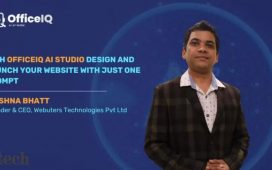If you haven’t read this year’s bestseller Lessons In Chemistry, you’re missing out.
Clever, funny and powerful, it follows the story of a single mother in the Sixties battling the patriarchy as she fights to make her way in the world of science. Abiogenesis specifically, aka the origin of life.
Thankfully that was a different era, but despite recent progress, women are still underrepresented across STEM industries – science, technology, engineering and mathematics.
According to the For Women in Science programme, a partnership between the Foundation L’Oreal and Unesco, women make up only a third of researchers worldwide, and less than 4% of Nobel prizes have been awarded to women.
In a bid to change that, the programme supports hundreds of young female researchers every year – and also highlights five scientists from around the world working on ground-breaking and vital research, awarding them the honour of International Laureate.
‘In the time of a generation, the For Women in Science programme has contributed to creating a real transformation by raising the profile of women representing every continent and breaking new ground in all disciplines,’ said Alexandra Palt, executive director of the Fondation L’Oréal. ‘However, while we are conscious of the progress we have made, we remain determined, as the task remains significant. The presence of women in science and particularly in senior positions is still too low due to the gender inequality and discrimination they still have to face.
‘We cannot encourage young women to direct their paths towards a scientific career without the assurance that they will be able to flourish with freedom and in complete safety in their workplace. Our most important mission is to promote, raise awareness of and support researchers, so that they can contribute fully to resolving the great challenges of our time and inspire future generations.’
To celebrate the incredible achievements of women in science, Metro.co.uk caught up with five UK recipients of the 2023 L’Oréal Rising Talent Awards, and asked what made them want to become a scientist.
‘I love trying to solve a mystery – and how the world works is the ultimate mystery. It’s a joy when you finally understand how something works or make a new discovery.’
Dr Kara Lynch, University of Manchester
‘I have always loved natural sciences, and as soon as I realised it could be a career path I knew I wanted to pursue research. I decided early on that I wanted a career that would always allow me to learn and be challenged. Science has certainly done that! Every day is different, and presents new problems to solve, big or small.’
Dr Sophie Nixon, University of Manchester
‘Science stimulates me; as a scientist, I enjoy the process of finding out the unknown and developing new techniques to solve problems, which ultimately contributes to the well-being of society.’
Dr Khushboo Borah Slater, University of Surrey
‘I decided to become a scientist almost by accident. In my first year of university at SUNY Geneseo, I was required to take a mathematics class, and I ended up taking Introduction to Logic. Even though I hadn’t initially planned on studying maths, it ended up being my favourite course all year. It was a totally different type of maths than I had learned in school, and I loved solving problems and exercising the critical reasoning part of my brain.
‘Afterwards, I decided to pursue a maths degree. Undertaking undergraduate research solidified my desire to earn my PhD and become a research mathematician. Throughout my journey, I’ve had amazing mentors who have pushed and encouraged me to be the best mathematician I can be.’
Dr Jane Ivy Coons, University of Oxford
‘I was fortunate to grow up in a family that highly values science and education, and this had a profound impact on my decision to pursue a career in science. From a young age, my parents instilled in me a love for learning and a curiosity about how things work. They taught me the importance of using the scientific method to explore and solve problems, which became second nature to me over time.
‘Additionally, both of my parents are doctors, and their passion for improving people’s lives motivated me to contribute to medicine and society through new scientific approaches. Their influence, along with the emphasis on science and education in my family, ultimately inspired me to embark on the path of becoming a scientist.’
Dr Amparo Guemes Gonzalez, University of Cambridge
Six more inspirational women in science…
Ada Lovelace Born in 1815 and the daughter of Lord Byron, Ada is widely regarded as ‘the first programmer’. A technological visionary, she essentially developed a language computers could read long before the first computer was invented.
Sophia Louisa Jex-Blake Born in 1840, Sophia was a pioneer in helping women attend and graduate from medical schools in the UK. As one of the ‘Edinburgh Seven’, she fought tirelessly against legal barriers, open hostility, and even a riot, to become the first practising female doctor in Scotland, opening two schools of medicine for women and a hospital along the way.
Rosalind Franklin Born in 1920, an x-ray photo taken by Rosalind proved a vital contribution to the discovery of DNA’s double helix structure attributed to James Watson and Francis Crick. Rosalind’s part in the breakthrough was only acknowledged after her death at 37 from ovarian cancer.
Katherine Johnson A mathematician at Nasa, Katherine was one of the human ‘computers’ essential to the success of the agency’s early space missions, calculating take-off and landing trajectories by hand. She and her colleagues were the unsung heroes of America’s winning hand in the space race, but their contributions – and the hardships they faced in the Jim Crow era – were shared with the world in the book and film Hidden Figures.
Sarah Gilbert and Catherine Green Months before the UK began taking Covid seriously, Sarah and Catherine had already begun work on a vaccine for the mysterious new respiratory virus causing deaths in a then little-known Chinese city. By November, their new vaccine was ready, and on January 4, 2021, 82-year-old Brian Pinker became the first person to receive the Oxford AstraZeneca jab. He would not be the last.
We also asked them what was the best piece of advice they’d been given during their career…
‘To not let the fear of failure hold you back from trying. Apply for that job, that research grant, as you never know – you might just get it.’
Dr Kara Lynch
‘Look after the science and the science will look after you. In other words, strive for excellence above all else in your research, and you will go far.’
Dr Sophie Nixon
‘Being a scientist is like running a marathon not a sprint – it requires resilience, perseverance and belief in your idea.’
Dr Khushboo Borah Slater
‘It is so important to ask questions. If there is a scientific concept you feel confused or unsure about, chances are other people in the room are feeling the same way. Your questions are valid and deserve to be answered – and oftentimes others will be glad that you asked on their behalf!’
Dr Jane Ivy Coons
‘You can’t find what you’re not looking for. This saying has become my motto as it emphasises the importance of having clarity about what you want or need in order to successfully find or achieve it. I apply this to both my research and life aspirations. Without a clear goal or direction, it becomes challenging to recognise or attain what we desire.
Dr Amparo Guemes Gonzalez
MORE : The Taliban threatened to shoot me in the head – just because I wanted to go to university
MORE : Sally Ride became the first US woman in space. Fans never knew she was keeping a secret
Get your need-to-know
latest news, feel-good stories, analysis and more
This site is protected by reCAPTCHA and the Google Privacy Policy and Terms of Service apply.

















